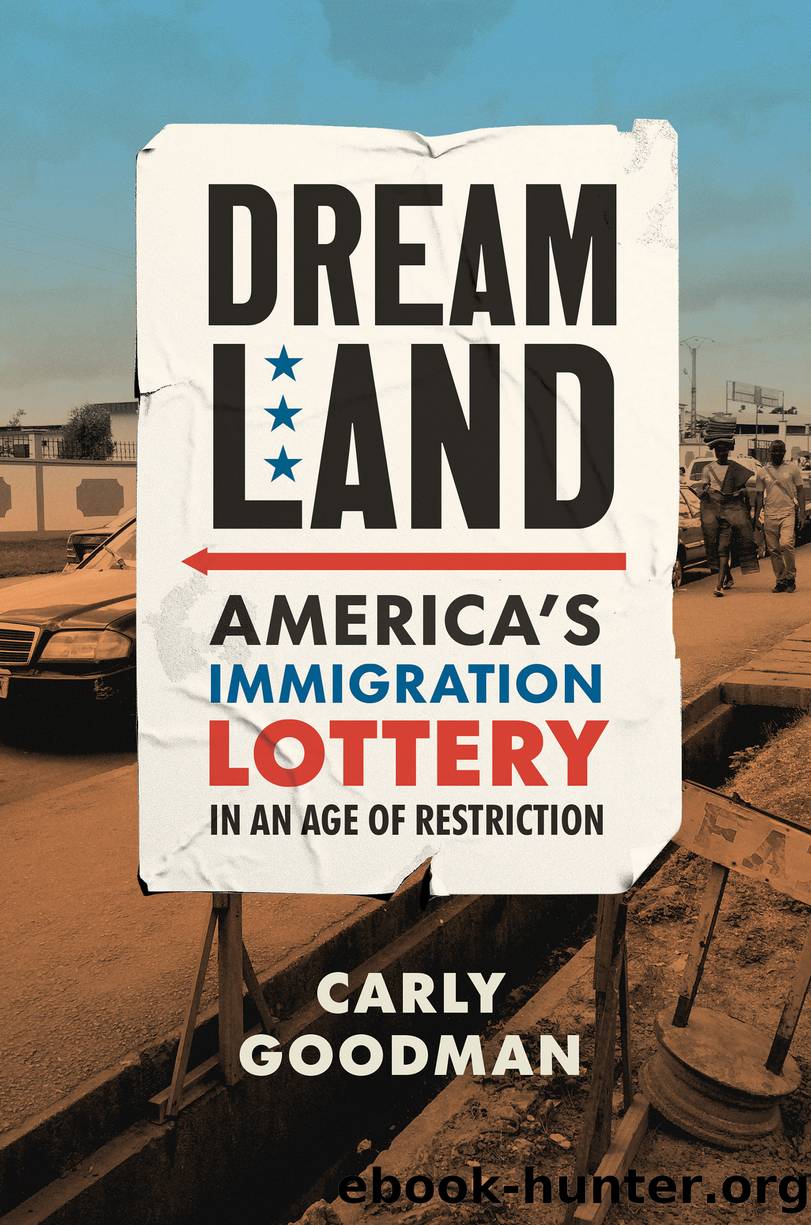Dreamland by Carly Goodman;

Author:Carly Goodman;
Language: eng
Format: epub
Publisher: University of North Carolina Press
* * *
âHard working,â âfamily oriented,â and âlaw abidingâ are elements of a kind of campaign for inclusion that ethnic groups themselves benefit from emphasizing, that advocates reinforce in public-facing communications and in policy debates, and that academics contribute to, wittingly or not. These characteristics have been selected for such campaigns because they tap intoâand aim to play up contrasts toâlong-running stereotypes that suggest that African Americans were none of these things. Immigrant groups often benefited from differentiation from native-born Black Americans, who have been made to remain at the bottom of Americaâs racial hierarchies even as the country has become more diverse.38
Negative and dehumanizing stereotypes about African Americans have roots going back to the institution of slavery, when Blackness became the justification for enslavement, when resistance to enslavement and violence could be framed as âlazinessâ or âcriminality,â and when violent family separation became a vicious tool of racial dominance. These tropes were further reinforced after Reconstruction and throughout Jim Crow, and reproduced again even as the civil rights movement remade U.S. institutions, to help explain and justify persistent inequality, discrimination, and disorder.
As Jemima Pierre argued, social scientistsâ representations of Black immigrants have reinforced such tropes, with scholars accepting and reproducing a flattened, hollow story about native-born African Americans in their work exploring the experiences of Black immigrants.39 Scholarsâ ideas about such differences then have been repeated in media coverage, aided by members of ethnic groups eager to position themselves and by advocates making arguments about immigrant inclusion.
Much of the news coverage about rising African immigration in the twenty-first century emphasized positive group traits. On average, African immigrants were younger than the overall U.S. population, more likely to be in the working age range, and less likely to be drawing on social security. Such data helped reinforce the notion that they were contributing more to the country than they took. They were also routinely described as better educated than the broader public. Research showed that nearly 42 percent of African-born immigrants possessed at least a bachelorâs degree, compared with 32 percent of the U.S. population overall.40 Labor force participation rates, likewise, hovered above those of the U.S. population. Compared with other immigrant groups, African immigrants were less likely to be undocumented and more likely to speak English.41 Given the publicâs hostility to undocumented immigration and assumptions about language acquisition, such data cast African immigrants as better than other groups, with qualities like education, English, legal status, and high wage employment taking on a moral valence.
In these ways, celebrations of the virtues of African immigrants could do the ugly work of highlighting implied differences between foreign and native-born Black Americans, and between African immigrants and other immigrant groups. Lifting up Black immigrant successes could thus reinforce anti-Blackness rather than challenge it. When law professor Amy Chua and her husband Jed Rubenfeld published their 2014 book The Triple Package, they argued that Nigerian Americans (along with seven other groups, including Cubans, Jews, East Asians, and Indians) succeeded in the United States because of a combination of cultural traits that sustained them.
Download
This site does not store any files on its server. We only index and link to content provided by other sites. Please contact the content providers to delete copyright contents if any and email us, we'll remove relevant links or contents immediately.
| Africa | Americas |
| Arctic & Antarctica | Asia |
| Australia & Oceania | Europe |
| Middle East | Russia |
| United States | World |
| Ancient Civilizations | Military |
| Historical Study & Educational Resources |
Cat's cradle by Kurt Vonnegut(15315)
Pimp by Iceberg Slim(14471)
4 3 2 1: A Novel by Paul Auster(12359)
Underground: A Human History of the Worlds Beneath Our Feet by Will Hunt(12078)
The Radium Girls by Kate Moore(12007)
Wiseguy by Nicholas Pileggi(5757)
The Fire Next Time by James Baldwin(5417)
Perfect Rhythm by Jae(5389)
American History Stories, Volume III (Yesterday's Classics) by Pratt Mara L(5290)
Paper Towns by Green John(5168)
Pale Blue Dot by Carl Sagan(4988)
A Higher Loyalty: Truth, Lies, and Leadership by James Comey(4942)
The Mayflower and the Pilgrims' New World by Nathaniel Philbrick(4482)
The Doomsday Machine by Daniel Ellsberg(4476)
Killers of the Flower Moon: The Osage Murders and the Birth of the FBI by David Grann(4430)
The Sympathizer by Viet Thanh Nguyen(4376)
Too Much and Not the Mood by Durga Chew-Bose(4324)
The Borden Murders by Sarah Miller(4302)
Sticky Fingers by Joe Hagan(4179)
